Loan Interest Rate: Getting a loan means thinking carefully about the interest rate. The is key in figuring out how much borrowing costs. It affects how much you pay each month and your long-term finances. Knowing what affects lets you make smart choices and get a that works for you. Your are main factors in setting your . Lenders check your credit score to judge and see if you’re likely to pay back. People with high scores usually get because they’re less risky to lenders.
Key Takeaways
- Your credit score is one of the most significant factors in determining your loan interest rate.
- Economic conditions, including inflation and the Federal Reserve’s actions, can impact loan interest rates over time.
- The loan amount, down payment, loan type, and term length can all influence the interest rate you’re offered.
- Lenders may view certain employment types and income sources as riskier, potentially leading to higher interest rates.
- Understanding the various factors that affect loan interest rates can help you secure the best possible terms for your financial situation.
Understanding Loan Interest Rates
To know loan interest rates, it’s key to understand a few basics. An interest rate is the cost of using someone else’s money. It’s shown as a percentage of the total loan. How much you pay in interest depends on your credit score and the economy. The trick is to get a low interest rate so you can save more money in the long run.
Also Read : Medical Science: How Is It Improving Diagnostic Techniques?
What is a Loan Interest Rate?
A loan interest rate is what a lender charges for using their cash. It’s a small part of what you owe, paid on top of the main loan. Knowing what a loan interest rate is helps you make smart choices when you need a loan.
Importance of Loan Interest Rates
Loan interest rates are super important. They change how much borrowing money costs. This affects both the monthly payments and the total you pay over time. Rates also have a big role in how the economy does. They can alter what people spend, invest, and if loans are easy to get. So, understanding loan interest rates and their effects is crucial for being wise with money.
Also Read : Which Types Of Loans Are Best For Small Businesses?
Credit Score: The Paramount Factor
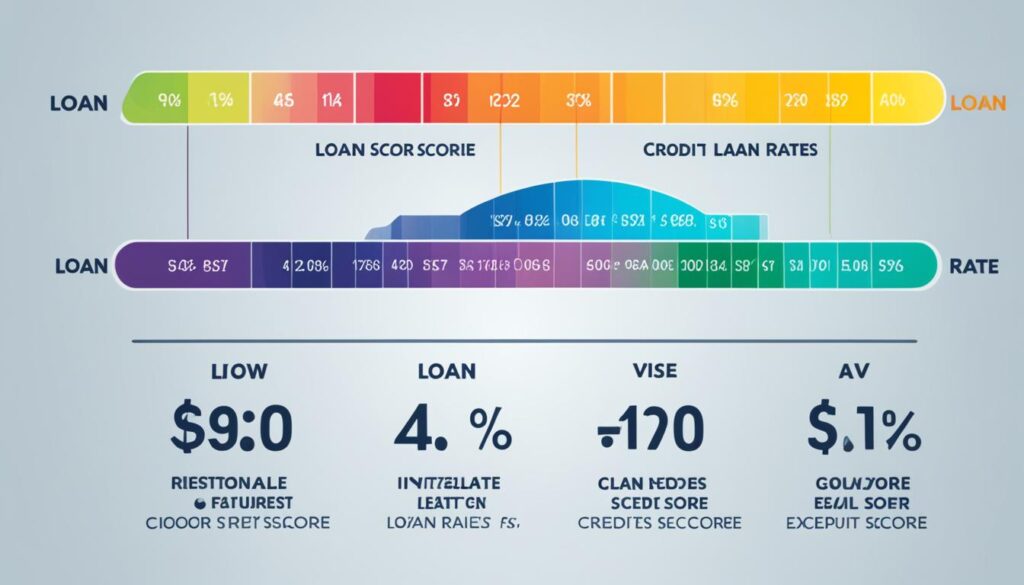
Your credit score hugely influences loan interest rates. Lenders check your score to see how trustworthy you might be in repaying. People with high credit scores usually get lower interest rates. This is because they are seen as lower risk.
Also Read : Car Loan: What Are The Best Options For First Time Buyers?
How Credit Scores Affect Interest Rates
If your credit score is excellent (around 760 or more), you’ll likely get the best rates. However, if you have poor credit (less than 670), you might face higher rates or loan rejections. Knowing this link between your credit score and the interest rate is key.
Improving Your Credit Score
Maybe your credit score isn’t in the best range right now. But don’t worry, you can improve it. Start by paying off your debts and fixing any credit report errors. Making payments on time also helps. These steps can help you get better loan offers. And, you’ll save money on interest over time.
Also Read : Undergraduate Scholarship: How Do You Prepare For Scholarship?
Loan Amount and Down Payment
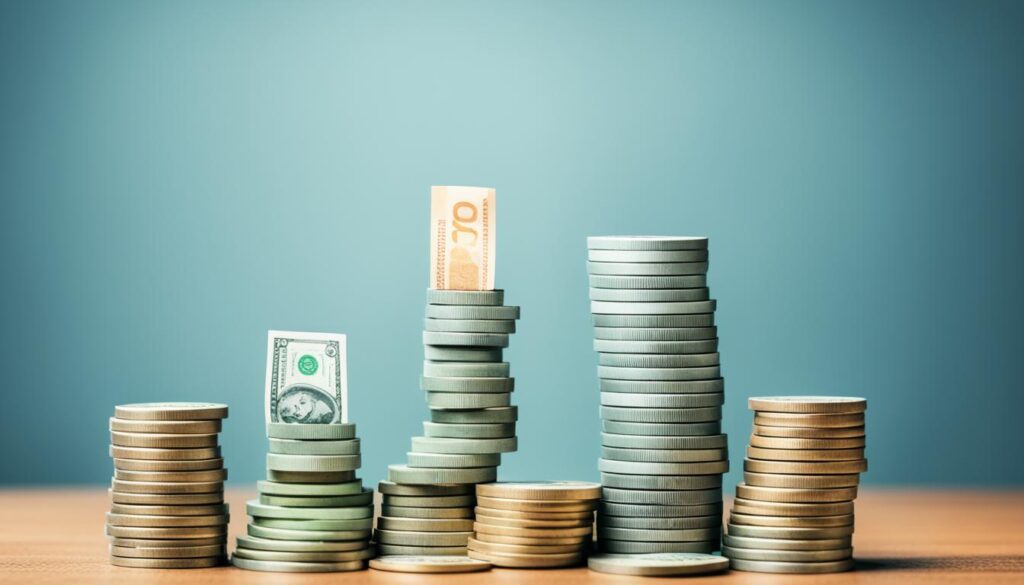
The loan amount and down payment influence the interest rate you get from lenders. The amount needed for a mortgage, which equals the home price and closing costs minus your down payment, affects your interest rate.
Also Read : How Can I Apply Scholarships For MCA?
Impact of Loan Size on Interest Rates
Larger or smaller interest rates might be charged by lenders for big or small loans. They look at the loan-to-value ratio, comparing the loan to the home’s worth, to decide. Bigger loans could mean higher risk for lenders, leading to higher interest rates.
Down Payment and Its Effect on Rates
The size of your down payment affects the interest rate you get too. A larger down payment (like 20% or more) lowers your interest rate. It shows you’re financially stable and reduces the lender’s risk. On the other hand, a smaller down payment can mean a higher interest rate.
| Loan Size | Down Payment | Interest Rate |
|---|---|---|
| $300,000 | 20% | 5.75% |
| $300,000 | 10% | 6.25% |
| $500,000 | 20% | 6.00% |
| $500,000 | 10% | 6.50% |
The table shows a clear pattern. A big loan amount without much down payment means higher interest rates. While smaller loans with bigger down payments often get lower interest rates. It’s wise to think about the loan size and down payment to get the best interest rate for your mortgage.
Loan Type and Term
Choosing the right mortgage type affects the interest rate you get offered. Lenders provide different loans with distinct criteria and rates. Knowing about conventional, FHA, USDA, and VA loans helps you pick the right one for your finances. This way, you can get a good interest rate.
Different Types of Loans
Conventional loans, not supported by the government, often offer the lowest interest rates. They are best for those with good credit and a 20% down payment. On the other hand, FHA loans, insured by the government, have higher rates but need only a 3.5% down payment. USDA loans are for homebuyers in rural areas with low-to-moderate incomes. VA loans are for military members and veterans. These loans also provide competitive rates.
Loan Term and Interest Rate Relationship
The length of your loan affects the interest rate you get. Typically, shorter-term loans like 15 years have lower interest rates than longer-term, 30-year ones. Lenders see short-term loans as less risky because there’s less time to default. Consider this relationship between loan term and interest rate to make a wise financial decision.
Loan Interest Rate
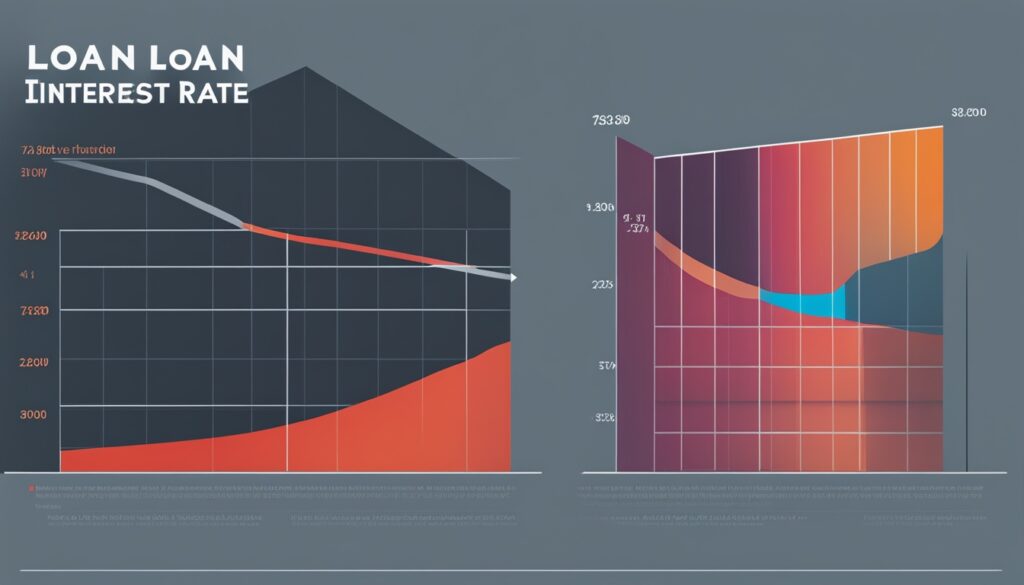
When getting a loan, you can choose between fixed interest rates and adjustable interest rates. It’s key to know what makes these loan types different. This helps pick the right one for your money situation.
Fixed vs. Adjustable Interest Rates
A fixed interest rate stays the same for the loan’s life. This means you’ll have the same monthly payment. It’s a good choice for those who like consistent payments over the years.
An adjustable-rate loan might begin with a fixed rate. Then, the rate changes according to the market. Initially, it might save you money with lower payments. But, the rates can go up, making your payments more costly.
Deciding between fixed or adjustable rates means looking at the benefits and downsides of each. A fixed rate ensures your payments are the same, helping you plan better. Yet, these loans usually start with higher rates. Adjustable loans could start lower but might be more expensive later.
Think about how long you’ll be using the loan and how much change in payments you’re okay with. If you’re in your home for a while and want predictable payments, a fixed-rate loan is likely your best bet. If you might move or are okay with your payments going up, adjustable rates could work better for you.
| Feature | Fixed Interest Rate | Adjustable Interest Rate |
|---|---|---|
| Rate Changes | Remains constant throughout the loan term | May adjust periodically based on market conditions |
| Payment Stability | Predictable monthly payments | Payments may fluctuate with rate changes |
| Suitability | Ideal for long-term, stable financial planning | Suitable for shorter-term loans or those comfortable with rate uncertainty |
| Initial Rates | Typically higher than adjustable rates | May start lower than fixed rates |
Picking a fixed or adjustable-rate loan involves understanding the details of each. Consider what fits best with your money goals and how much risk you’re willing to take. With the right info, you can choose the best loan for you.
Geographic Location and Property Type
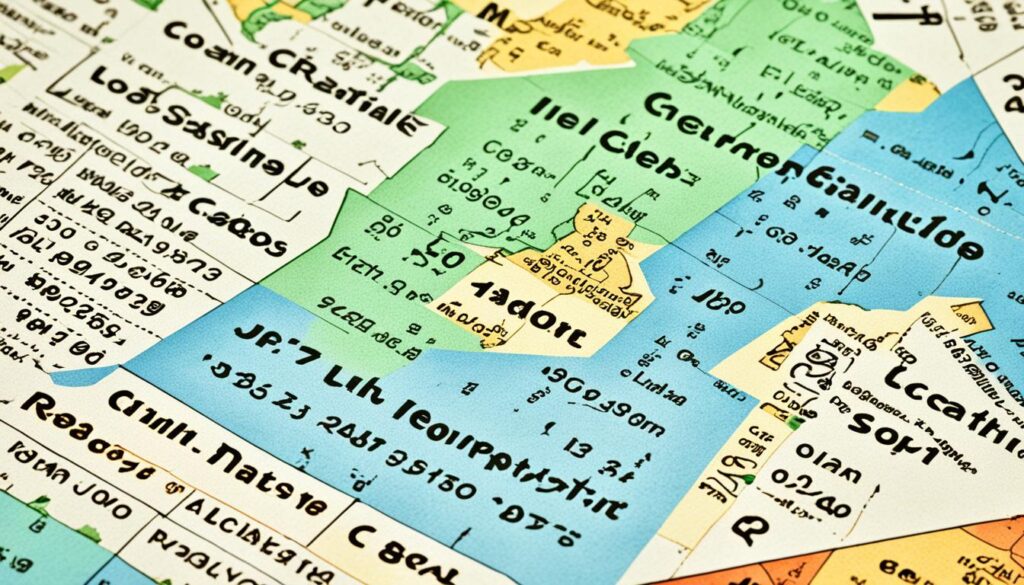
The place a property is at matters a lot when getting a loan. For example, interest rates may change based on the state or county of the property. You can check out the Explore Interest Rates tool to see what rates are common in your area. This helps you figure out how where you are actually affects your rate.
Also, the type of property makes a difference. Lenders could give different rates for homes versus commercial or investment properties. They think some kinds are riskier. The property’s size, what it’s used for, and its value all help decide the rate too.
| Property Type | Typical Interest Rate Range |
|---|---|
| Single-Family Residential | 3.5% – 5.5% |
| Multifamily Residential | 4.0% – 6.0% |
| Commercial | 5.0% – 8.0% |
| Investment Property | 5.5% – 8.5% |
Knowing how location and property type affect rates helps you choose the best loan. It lets you make smarter choices for your financing needs.
Employment and Income Factors
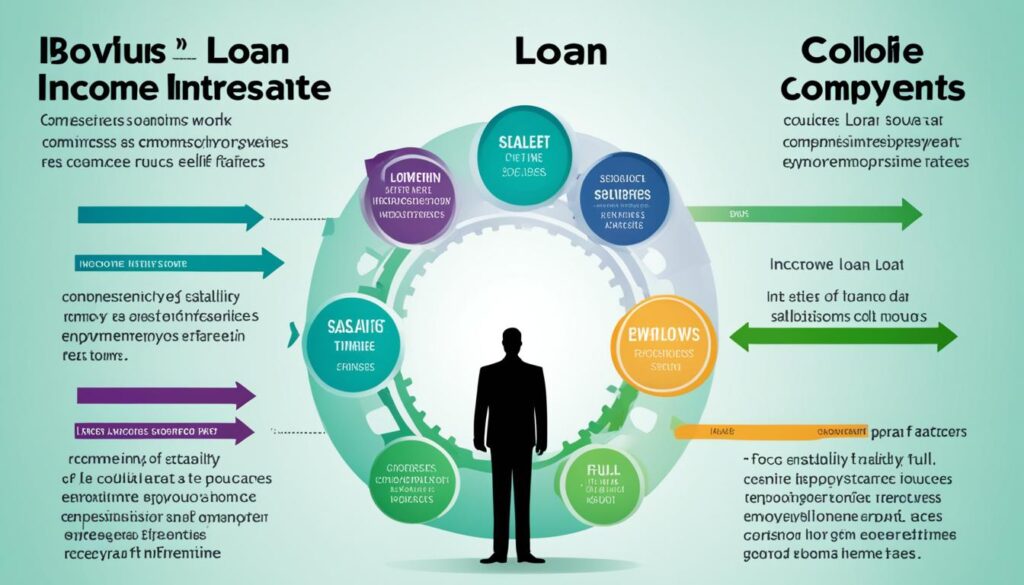
Your job and how much you make are super important when you want a good loan interest rate. Lenders think self-employed people, those who get paid by the hour, or those who depend on bonuses are more of a risk. This might mean they get charged higher interest rates on their loans.
The impact of income on interest rates is big for lenders. They see people with regular salaried jobs as safer to lend to. This trust can lead to lower interest rates compared to people who are self-employed or who get paid on commission. Your debt-to-income ratio and if you include bonus pay in your total income can also change your interest rate.
| Employment Status | Impact on Loan Interest Rates |
|---|---|
| Salaried | They get lower interest rates. Lenders see them as more stable and dependable financially. |
| Self-Employed | They might face higher interest rates. Lenders see them as more of a risk because their income can change. |
| Hourly Wage | Interest rates could be higher. Lenders might think hourly workers are less financially safe than those with steady salaried jobs. |
| Bonus-Based Income | How reliable and steady they think your bonus pay is can affect your interest rates. |
It’s smart for borrowers to know how your job affects interest rates and the effect of your income on these rates. It helps you get better loan terms. In the end, lenders want to lower their risks, and your job and income are a big part of their choice.
Economic Conditions and Market Trends
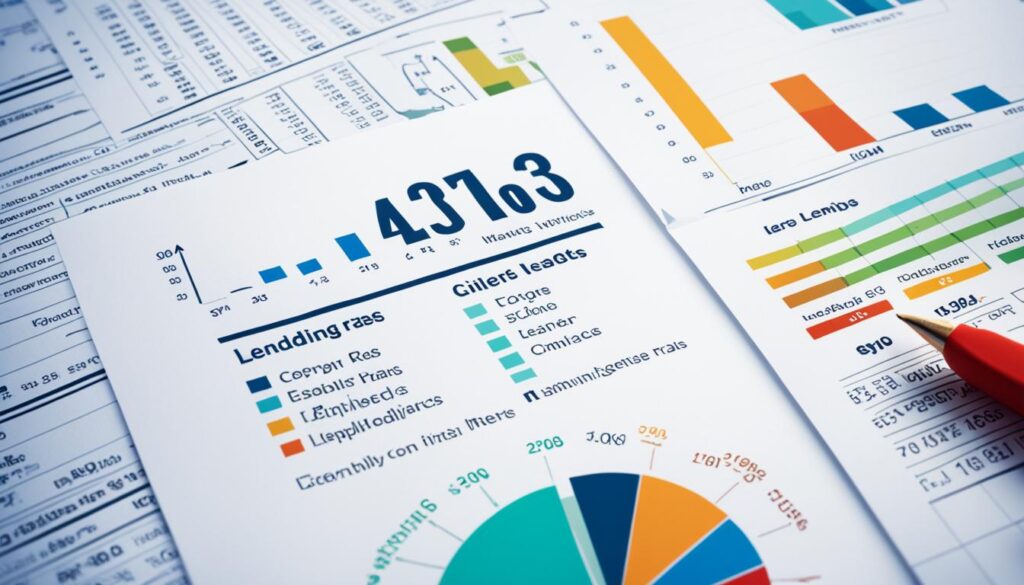
Interest rates and gas prices can change a lot due to big economic conditions. People can’t control these changes. But, it’s important to know the normal interest rate levels. This helps know if a quote is too high or low.
Impact of Economic Factors
The relationship between interest rates and inflation is crucial. In a strong economy with rising prices, the Federal Reserve often increases Interest rates. This is to slow things down. But in a slow economy, they may lower rates to boost spending.
Monitoring Interest Rate Trends
To track interest rate movements and forecast future loan rate changes, watch key economic signs. These include things like GDP growth, job rates, and the Consumer Price Index. Also, keep an eye on the Fed’s policy updates. They give hints about future interest rates.
Also Read: Mortgage Loan: How Does It Work?
Conclusion
Many things affect the interest rate you get on a loan. These include your credit score, how much you’re borrowing, and your down payment. Also, what type and how long your loan is, where the property is, your job, and your income matter. Plus, the current economy plays a big role. Knowing these factors helps you pick the best loan deal for your situation.
To get a better interest rate, you should boost your credit score and save more for a down payment. It’s also important to keep an eye on what’s happening in the loan market. Doing these things can help you get through the process of finding a reasonable interest rate. It will make reaching your money goals easier too.
Understanding what affects loan interest rates can make you smarter about taking out loans. With this knowledge, you can save a lot of money and plan for a strong financial future.
FAQs
What is a loan interest rate?
A loan interest rate is the price to borrow money. It’s shown as a part of the total loan cost. This cost tells you how much more you need to repay with the loan amount.
How important are loan interest rates?
They are very important. They affect how much you pay back in total. A lower rate means you pay less over time.
What factors determine a borrower’s loan interest rate?
Your rate is tied to many things. These include your credit score, the size of your loan, and your down payment. Loan type, where you are, your home type, job, and income also matter. Economic conditions play a role too.
How does a borrower’s credit score affect their interest rate?
Your credit score affects your interest rate. A higher score often means a lower rate. Lenders see better scores as less risk.
How can a borrower improve their chances of securing a lower interest rate?
To get a lower rate, do a few things. Improve your credit score. Save for a bigger down payment. Choose the best loan and watch the market.
What is the difference between fixed and adjustable interest rates?
Fixed rates stay the same. Adjustable rates can change. When choosing, think about how market changes could affect your payment.
How does a property’s location affect the interest rate?
Where a house is can change the interest rate. Rates might vary by location or even by state.
How does a borrower’s employment and income affect their interest rate?
What you do and how much you make matters. It affects what you might pay. People with stable jobs often get lower rates.
How do broader economic conditions impact loan interest rates?
The economy can change loan rates. This is like how gas prices change. Be aware of these shifts to spot good deals.
